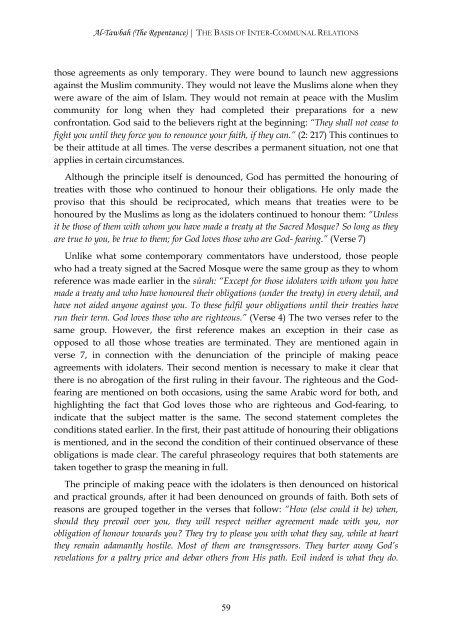Volume 8 Surah 9 - Enjoy Islam
Volume 8 Surah 9 - Enjoy Islam
Volume 8 Surah 9 - Enjoy Islam
- No tags were found...
Create successful ePaper yourself
Turn your PDF publications into a flip-book with our unique Google optimized e-Paper software.
Al-Tawbah (The Repentance) | THE BASIS OF INTER-COMMUNAL RELATIONSthose agreements as only temporary. They were bound to launch new aggressionsagainst the Muslim community. They would not leave the Muslims alone when theywere aware of the aim of <strong>Islam</strong>. They would not remain at peace with the Muslimcommunity for long when they had completed their preparations for a newconfrontation. God said to the believers right at the beginning: “They shall not cease tofight you until they force you to renounce your faith, if they can.” (2: 217) This continues tobe their attitude at all times. The verse describes a permanent situation, not one thatapplies in certain circumstances.Although the principle itself is denounced, God has permitted the honouring oftreaties with those who continued to honour their obligations. He only made theproviso that this should be reciprocated, which means that treaties were to behonoured by the Muslims as long as the idolaters continued to honour them: “Unlessit be those of them with whom you have made a treaty at the Sacred Mosque? So long as theyare true to you, be true to them; for God loves those who are God- fearing.” (Verse 7)Unlike what some contemporary commentators have understood, those peoplewho had a treaty signed at the Sacred Mosque were the same group as they to whomreference was made earlier in the sūrah: “Except for those idolaters with whom you havemade a treaty and who have honoured their obligations (under the treaty) in every detail, andhave not aided anyone against you. To these fulfil your obligations until their treaties haverun their term. God loves those who are righteous.” (Verse 4) The two verses refer to thesame group. However, the first reference makes an exception in their case asopposed to all those whose treaties are terminated. They are mentioned again inverse 7, in connection with the denunciation of the principle of making peaceagreements with idolaters. Their second mention is necessary to make it clear thatthere is no abrogation of the first ruling in their favour. The righteous and the Godfearingare mentioned on both occasions, using the same Arabic word for both, andhighlighting the fact that God loves those who are righteous and God-fearing, toindicate that the subject matter is the same. The second statement completes theconditions stated earlier. In the first, their past attitude of honouring their obligationsis mentioned, and in the second the condition of their continued observance of theseobligations is made clear. The careful phraseology requires that both statements aretaken together to grasp the meaning in full.The principle of making peace with the idolaters is then denounced on historicaland practical grounds, after it had been denounced on grounds of faith. Both sets ofreasons are grouped together in the verses that follow: “How (else could it be) when,should they prevail over you, they will respect neither agreement made with you, norobligation of honour towards you? They try to please you with what they say, while at heartthey remain adamantly hostile. Most of them are transgressors. They barter away God’srevelations for a paltry price and debar others from His path. Evil indeed is what they do.59
















